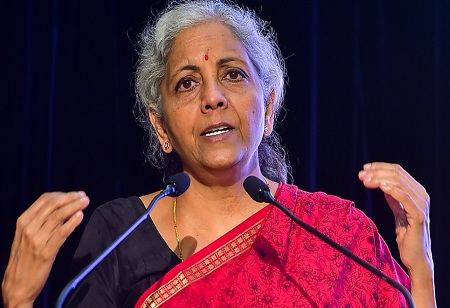By Consultants Review Team
 The G20 Finance Ministers and Central Bank Governors (FMCBG) meeting, which lasted for two days in Washington, concluded with a recognition of the need to address the debt vulnerabilities, including improving multilateral coordination to address the growing debt distress in low-income and vulnerable middle-income countries as well as challenges to the global economy, including Ukraine.
The G20 Finance Ministers and Central Bank Governors (FMCBG) meeting, which lasted for two days in Washington, concluded with a recognition of the need to address the debt vulnerabilities, including improving multilateral coordination to address the growing debt distress in low-income and vulnerable middle-income countries as well as challenges to the global economy, including Ukraine.
The participants came to the conclusion that international policy responses to crypto assets are necessary. Nirmala Sitharaman, the minister of finance, who presided over the meeting on April 12 and 13, told the media that low- and middle-income nations need funds for developmental initiatives. "There are pockets of underdeveloped areas in middle-income countries, especially in the post-pandemic era, which desperately need funding for development," she continued.
"We are turning to the World Bank for two key purposes: reducing extreme poverty and fostering prosperity after poverty alleviation. The third pillar will now need to include sustainability objectives, climate finance targets, and energy transition goals, according to Sitharaman. There has been a higher acceptance among G20 members of India's proposal to regulate crypto assets, according to the report. The G20 and its members concur that no one nation will be able to handle digital assets, the Finance Minister said.
To regulate crypto assets, there needs to be a unified worldwide understanding. The Financial Stability Board's (FSB) paper is currently being discussed, and the IMF paper will follow soon. She added that a synthesis document based on the work of the IMF and FSB would be prepared. There is an awareness that crypto assets, especially those that are not backed by any sovereign assets, can lead to macroeconomic instability, according to Sitharaman.
Finance Minister, constructive conversations on the debt restructuring issue took place at the "Global Sovereign Debt Roundtable," which included private players, impacted countries, and all parties involved in financial distress-related issues.
"Discussion on climate finance is progressing well, both in terms of the current flow and the quantity needed to address climate issues. Additionally being considered are private financing, transitory expenses, and technological requirements, the spokesperson added. According to Sitharaman, the Global Partnership for Financial Inclusion (GPFI) negotiations at the G20 also advanced.
"Countries showed a strong interest in using Digital Public Infrastructure (DPI) to increase productivity and financial inclusion worldwide. Cross-border payment concerns are included while discussing crypto and DPI. She stated that the problem of cross-border payments "has the potential to be a very important instrument to have a good buy-in from all the G20 countries.
The FMCBG meeting on international taxes concentrated on the urgent need to mobilise worldwide efforts in order to achieve a fair, sustainable, and contemporary international tax system. All members have advocated for the two-pillar international tax package to be implemented quickly, Sitharaman said.
We use cookies to ensure you get the best experience on our website. Read more...